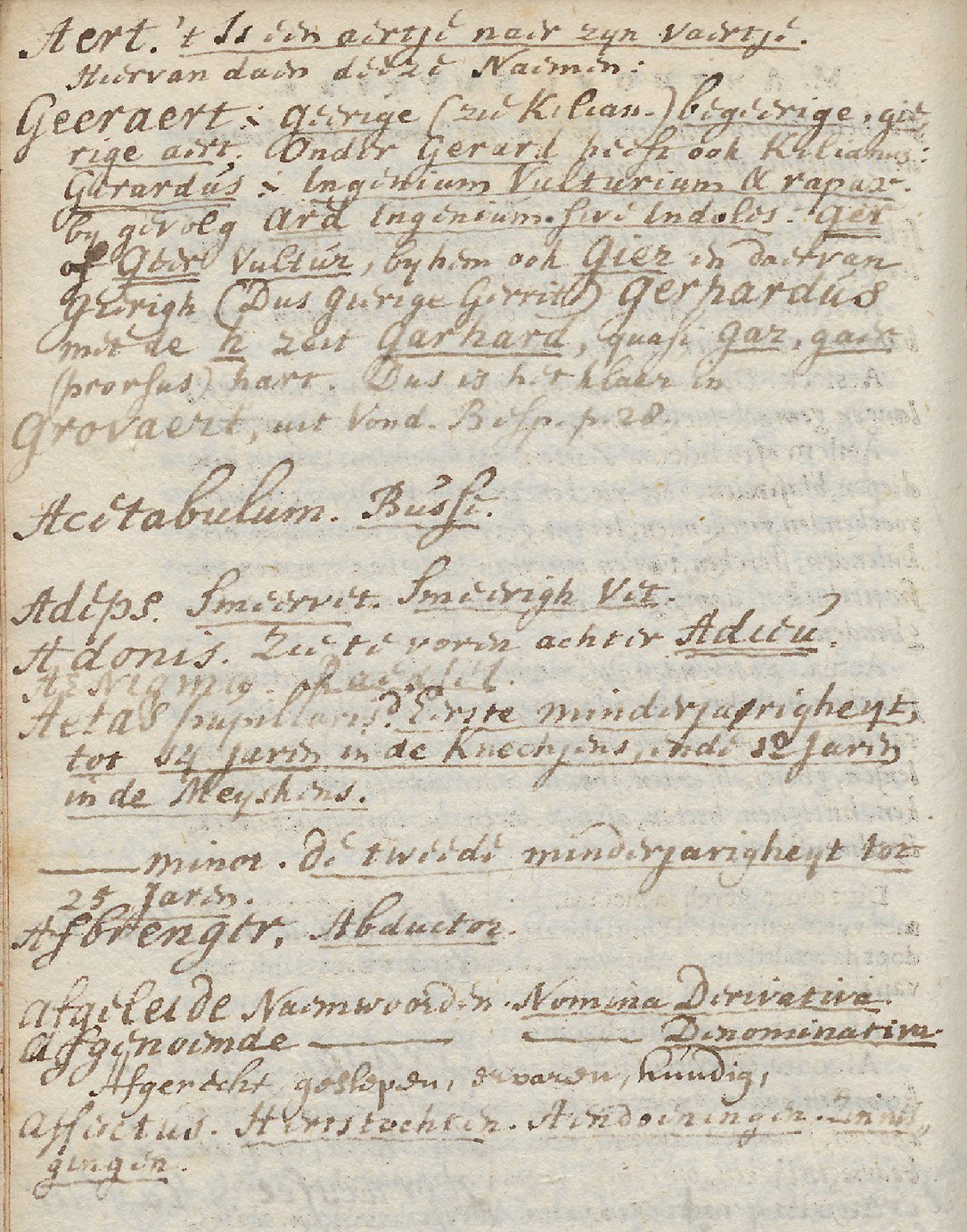'Epitheta' by Anthoni Smyters
Poeraet in the War of the Poets
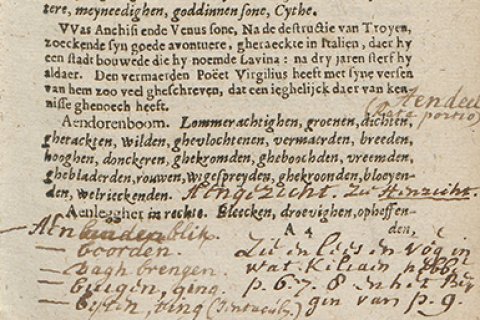
Ei, vrinden, toch: mijn Wijf moet hebben op haer bil. Roemwaerdigh is zij mij in wangunst en trillil. (‘Well my friends, my wife should be spanked. To me she is worthy of fame for her envy and quivering flesh.’) This curious remark can be found in a poem by the clergyman Pieter Poeraet (1684-1747), in an interleaved copy of Epitheta, dat zijn bynamen oft toenamen (‘Ephiteta, these are adjectives or adverbs’), a work by Anthoni Smyters (approx. 1545-1625), published in 1620. Poeraet’s notes and additions were part of his interference with the War of the Poets which disputed whether poems should be written in Latin or in the vernacular and if, in the latter case, they were to be based on the texts of the 16th-century Dutch poet and playwright Joost van den Vondel.
An expanded dictionary
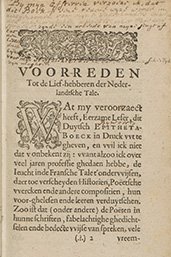
On the title page of Poeraet’s copy of Smyters’ Epithea is written: vermeerdert door Peter Poeraet’ (‘expanded by Peter Poeraet’). A century after its publication the clergyman added all kinds of headwords and notes to the dictionary. This is interesting in relation to the research into readers’ notes, but also in light of the background to Poeraet’s note : the codification of the Dutch language. Epitheta was useful to Poeraet to such an extent that he regarded the expansion as his life’s work for the benefit of his country and native language. He wanted the book, including his notes, to be a luister of our moederspraecke’ (a ‘magnificent show’ of our ‘mother tongue’). (see the note written above the voorrede, transcription in Annotated Books Online, scan 17).
Epitheta and language codification
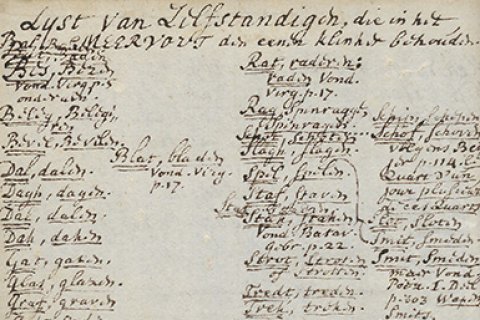
An epitheton (Greek for that which is added) is an ‘adjective which in a fixed combination with a noun, in particular a proper name, is used to characterize or adorn’ (source: Woordenboek der Nederlandsche Taal / Dictionary of the Dutch Language). Smyters’ Epitheta contains more than 2800 headwords, at which adjectives are listed and sometimes explained. For instance, the words ill-mannered and ignorant are linked to the word farmer (see also Van der Sijs 1999, 13). The subtitle explains the purpose of the work:
Een boeck, niet alleenlijck bequaem ende dienstlijck voor alle die de poëten-konste beminnen, maer oock om alle andere Nederduytsche compositien te vercieren: met oock korte uutlegginghe van zommige sware namen ende woorden. (‘A book, not only agreeable and convenient to all that love the art of poetry, but also meant to adorn all other Low German compositions, containing short explanations of some important names and words as well’).
The words in the book are useful to poets, but also to all other writers. In the early 17th century Smyters wanted his Epitheta to be a source for language lovers and poets, a source that they could use for constructing, enhancing and adorning the Dutch language. According to the introduction, the dictionary should supply in the need for building stones tot opbouwinghe onser Nederlandtsche Sprake (‘to construct our Dutch language’). Smyters wanted to emphasise the beauty of the mother tongue. He argues that to this purpose the epitheta are essential, they are a vital part of the argumentation of a poem.
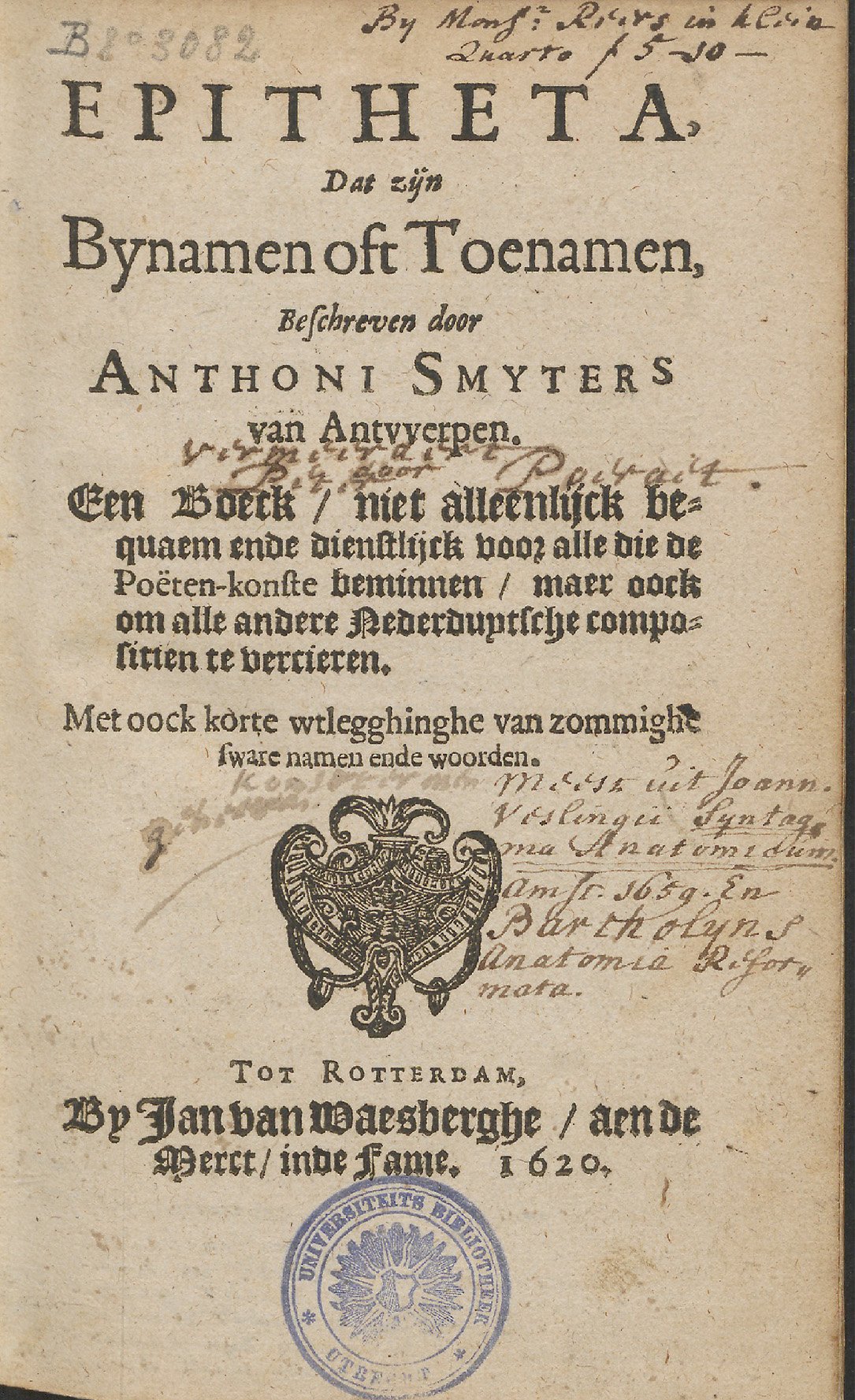
War of the Poets
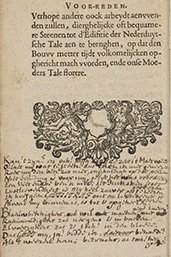
Smyters’ work shows how people were searching for the glorification of their own language. In the search for the standardization of the Dutch language, many took the great writers, Vondel and Hooft, as their point of departure. Also in the early 18th century Dutch Republic there was a great deal of interest in the search for the norms in a standardized language. Works were published such as Aenmerkingen over de geslachten der zelfstandige naemwoorden (‘Notes on noun gender’) by David van Hoogstraten in 1700, influential grammar books such as the one by Arnold Moonen in 1706, and other linguistic works in the field of language standardization. Poeraet’s notes in Epithepa also fit within this framework, and can also be considered in the light of the War of the Poets (ca. 1711-1716). This dispute revolved around the question whether to write poetry in Latin or in the mother tongue; and at a later stage the question was which literary predecessors and which views should be followed: Vondel, Hooft or French classicism? The dispute was a continuation of the Vondel discussion initiated by Nil Volentibus Arduum, the 1669 art society (Altena 1986, 10), and Poeraet in writing reviews for the journal Boekzael van Europe (‘Library of Europe’) played a major part on the side of the Vondel supporters (Jongenelen 2014).
Poeraet
Pieter Poeraet was a clergyman in Nederhorst den Berg, but he was dismissed from office in 1730 due to lapses in his church activities (see also Hanou 1988). André Hanou attributes this event for the larger part to Poeraet’s character: he was a proud man, unwilling to admit to his mistakes. Also in the War of the Poets Poeraet was a tenacious debater, both via de Boekzael and in personal discussions (for instance with Jacob Campo Weyerman, see Jongenelen 2014). Poeraet loved to play with words and linking words together (hence he found great use in Epitheta). However, Weyerman believed that a good author showed his talent if he could say a lot with a few words (Jongenelen 2014, 19).
Annotations
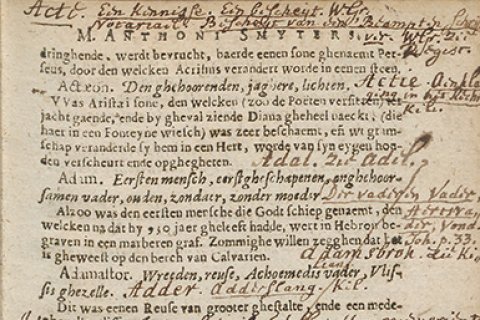
Poeraet’s views can be traced in his notes in Epitheta. It soon becomes clear that he wants to imitate Vondel and Hooft, because at many headwords he added all kinds of references to these writers. See for instance at the headword `Abraham’ where he writes on the page next to it (scan 35): Der Geloovigen Vader, Vond. Aertsvader, ld. Besp. p. 177. (‘The faithful Father, Vond. Patriarch, Id. Besp. P.177). This is a reference to Vondel’s Bespiegelingen van Godt en Godtsdienst (1662) (‘Reflections on God and Religion’, 1662). Besides references to works by Vondel there are many references to works by Hooft, Kiliaen, Willem de Groot (1597-1662), Arnold Moonen, Geeraardt Brandt and Joachim Oudaen. Poeraet also added many medical terms from two medical handbooks he used (viz. Syntagma anatomicum and Anatomia reformata) for instance ‘Lower belly, abdomen’.
Imitation
In a poem at the beginning of the book Poeraet calls upon youngsters, who he thinks have time to write poetry, to imitate de beste lichten (‘the brightest minds’), i.e. Vondel etc. Similar to David van Hoogstraten who published all kinds of editions of poets supporting Vondel to promote the art of poetry, Poeraet may have wanted Epitheta to be a weapon in the dispute. By the many references to works by Vondel, Hooft and others, Poeraet took care that an author who used Epitheta expanded with his notes/additions automatically imitated the great writers.
Improving and completing
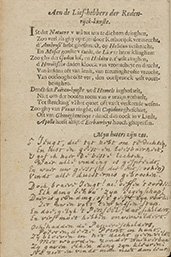
Also by small adaptations Poeraet’s views emerge, both in the language debate and in the field of religion. For instance he crossed out the final ‘n’ of words as if he wanted to say: it is not ‘den’ but ‘de’, no ‘beleefden’ but ‘beleefde’ (at the letter A, scan 33). Because Poeraet was a Protestant clergyman, whereas Smyters was a Roman-Catholic, Poeraet also added improvements and additons from a Protestant point of view. At Predikanten. Catholijcke, Dienaers des Goddelijcken Woordts, eenvoudighe, gheleerde, zedighe (…) Theologhen, (…) vermaenders, (…), tekst-rijcke (‘Clergymen, Roman-Catholics, servants to the word of God, simple, learned, chaste (…), Theologians, (…) admonishers, (…), full of words’) he wrote the following in the margin: ‘afgezanten der hervormde kerke (…) gewijden’ (‘representatives of the Protestant church (…), consecrated men, scan 577). On scan 33 (ghewijden) Pape (‘consecrated papist’) at the headword Aaron is crossed out and replaced by the sentence Der Priesteren Zonne, (‘the priest of the sun’), an expression by Vondel.
Poems
Besides the additions at the headwords, we also find poems in the beginning and at the end of the book, including an epitaph which relate to Poeraet’s life (here he also wrote about his wife Kornelia van Breda). There is a prayer in which Poeraet asks God if he may continue his letterwerken (‘letter works’), so he would like to keep on writing. He remarks that he has often fought a slag van letteren (‘a literature battle’) (the War of the Poets!) and that he cannot tolerate heretics (the opponents). In a poem about language and writing (scan 7) the language catches sounds and letters and they teemen, rammlen, drillen en strijken, zalven, scherssen, lillen. (‘whine, rattle, grind and brush, smooth, jest, quiver’). Poeraet thinks language and poetry are a sign of divinity. He concludes the poem by expressing his wish that his work may come to light, and that his goal is to honour God by his works. (scan 9).
Author
Karolien de Jager, January 2017
